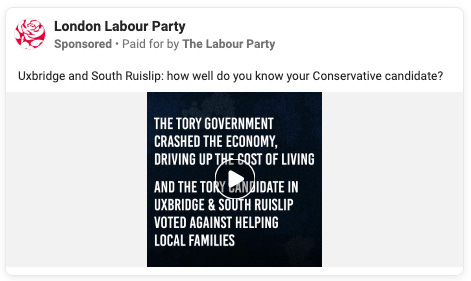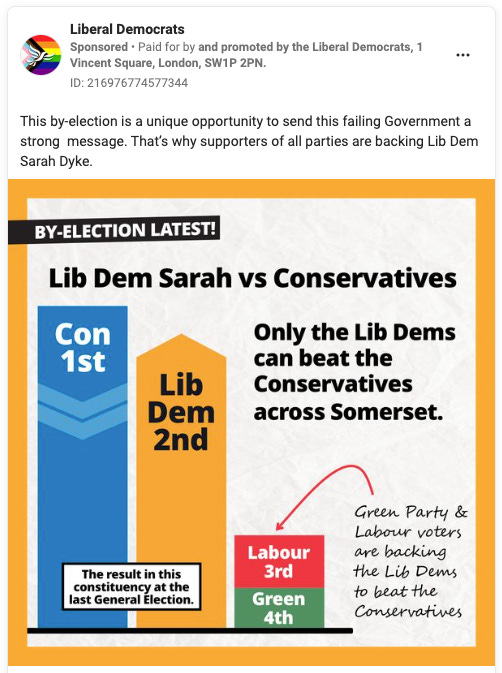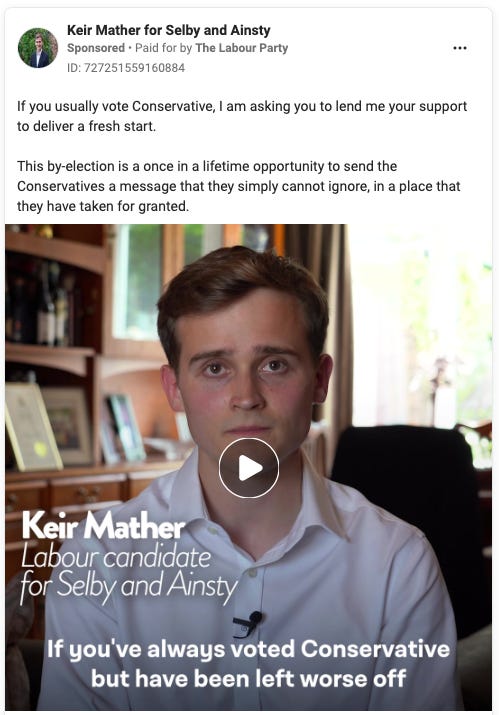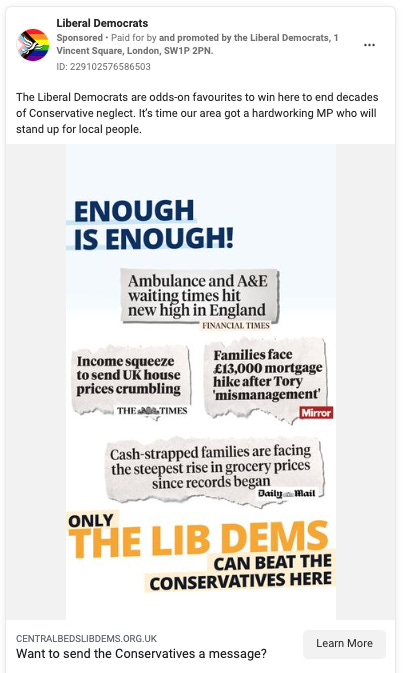How to win a by-election
A conversation with someone who's been there and done that, as well as what we're seeing in the four current by-election campaigns.
This issue of Full Disclosure is a two-parter…
The first part is an interview with Shaun Roberts, who ran election campaigns for the Liberal Democrats. The second part is a summary of the ads and data we’ve picked up around the four forthcoming by elections.
As usual, if you’re not a subscriber, please do sign up. If you are, and you like what we do, please consider taking out a paid sub and supporting Who Targets Me’s work.
Today’s interview is with Shaun Roberts, who was Director of Campaigns for the Liberal Democrats between 2017 and 2019. He was elected as a councillor in his hometown of Leighton Buzzard this May. We spoke last week.
Full Disclosure: Hi Shaun - thanks for taking the time to chat.
As we speak, there are four by-elections coming up and two of them seem very winnable for the Liberal Democrats. There are big majorities to overturn but they're very much of the kind that has been won by the party in the past.
Specifically, in your patch, for (the still-not-actually-called) by-election for Mid-Bedfordshire, if you were Director of Campaigns today, what would your plan be to win the seat?
Shaun Roberts: Mid-Bedfordshire will vote for a non-Tory, that is very, very clear. And as far as the Liberal Democrats are concerned, the best chance is to establish yourself as the non-Tory, the main challenger. To do that you need to get to as many doorsteps as you can, you need to get leaflets through doors, you need to get into those social media feeds, so people asking themselves “Who can beat the Conservatives here?” understand that the answer is the Liberal Democrats.
This is a battle the party has to go through in almost every election, because the default for most people is, is it Labour or is it Conservative? If you’re the Liberal Democrat, you have to force yourself into that argument.
But it’s worked plenty of times before. We finished third in Mid-Bedfordshire last time, but we also finished third in Tiverton and Honiton, which we won, we were third in North Shropshire, which we also won, so it’s not really about what happened at the last election.
Instead, it's about showing who's got the biggest capacity to get the most votes in the coming election, and in these more rural constituencies that’s not Labour because there are so many Tories who physically will never, ever vote for them. We just have to make sure we avoid a situation where Labour and the Lib Dems get 30% each, leaving 40% to the Tories. To me, that’s their one chance of winning this time.
FD: Some of that job gets done for you, right? People will pre- assign these narratives to these by-elections early on, then the parties adjust strategy accordingly. Labour gets Uxbridge and Selby and Ainsty, you get Mid-Bedfordshire and Somerton and Frome.
SR: Yes, but all parties are tribal, and there are people in all of them who think that, no matter what, you fight to win. When they do that, they aren’t thinking about the bigger picture, which means some form of tactical voting is something of a necessity. No one likes it, but it’s a reality.
We won Eastleigh in 2013 with about 35% of the vote because UKIP got 30% and so did the Tories. On that occasion, it was a good thing there were basically two conservative parties running against us. So it works both ways, but it still sucks. Those of us who are progressive, and tend by our nature to be more idealistic, really struggle with it because you’re operating in a system that’s anything other than ideal.
FD: Let’s head back to Mid-Bedfordshire. You're sat in your giant chair at your huge walnut desk in Lib Dem HQ. You have resources at your disposal - the hundred grand you get to run a by-election campaign, a certain number of days and weeks ahead, activists who will give their time. What do you choose to do? How do you divide up that budget?
SR: With the Liberal Democrats historically, digital gets a low share - our campaigning has been overwhelmingly paper-based, to the tune of about 90% of our spending.
I recently got elected in my hometown. We ran some Facebook ads for the election, but actually as an individual it was a pain, because you just end up with lots of negative comments, which you have to deal with.
For me, the presence on the doorstep was the most effective thing. Ultimately, all political campaigns want to interrupt people’s lives to get them to pay attention. In the end, nothing is more interruptive than a person arriving at your door, so that's the first priority. The second is a bit of paper arriving on your doormat. For me, Facebook, or social media in general, is still behind that.
FC: To win a council seat you needed 1000-1500 votes? At that scale, you can knock on every door.
SR: Yes. But also, the lower the turnout of an election, the more effective in-person campaigning is. Some pretty long-established studies show that, in low turnout elections, if somebody is visited by the candidate, the chances of them voting shoot up.
FD: But what happens when the electorate is 100,000 people? When you can’t scale it up to knocking on every door?
SR: That’s where, at least for by-elections, our volunteers come in. And again, because by-elections have lower turnout - usually 50% or less - but a lot of attention, you can reach a lot of people, even in a short period.
For me the experience of door knocking is just better. When I look at the same sort of “debate” you get with social media my observation from doing it myself, in the big Facebook Group in the town, is that the conversation that happens there is very confrontational. People have simply lost the ability to disagree with each other politely. So you can’t just wade into these groups. You need to be careful. They’ve replaced the local paper, but they’re not the same. They feel riskier, so that’s why I think there’s some comfort in traditional campaigning methods, because they don’t change.
As for online advertising, it’s just difficult to get good data for by-elections, because there’s simply no run-up. But Mid-Bedfordshire hasn’t been hard fought for a long time. Even the local Conservatives probably don’t know that much about the electorate. So you’re just building from scratch, trying to identify audiences, get people to take surveys, learn about what people think. Because the constituency hasn’t been competitive, voters are going to be challenged - they’re going to see new information, coming into their house, onto their screen.
FD: What will that challenge look like? In any campaign, there’s a mixture of positivity and negativity. You talked about your “define ourselves as the realistic challengers here” strategy. But at some point, the Tories will pick their candidate, but they've also got Dorries and Boris Johnson in the background, Rishi Sunak too, as well as all the issues people care about at the moment. It seems like there are lots of options about what to go with?
SR: I think it's different to what it would ordinarily be. People have decided the Conservatives are useless. That’s actually rare. Normally in a by-election, you think, okay, “how do I make a case for change in this area?” But today the voters are already there. They're pre-cooked. You don’t even need to be negative. Just about everyone knows that nothing works in this country right now. People are angry and resigned. So I think people need more positivity, they need more hope. I think we’ll run a campaign to remind people the Conservatives are responsible for the mess we're in, but that also says “we can change this, we can make a difference”.
There’s just no point in leaving people sitting at home thinking “it’s all terrible.”
FD: Going back to thinking about data…what might you have at the beginning of a campaign like this and what might you be able to get a hold of? Or are you just going in blind and knocking on as many doors as you can to start finding out who your voters are?
SR: Well, we’ll know who voted at the local elections because we get access to the marked register. For a by-election, that’s enormously powerful, because people who vote in locals generally also vote in by-elections. That’s your starting point. We’ll also know about postal voters, who are very likely to vote in by-elections as well. This data is very helpful for door-knocking and direct mail.
But for social media advertising, we don’t have those resources. There, it’s going to be mostly geographical targeting, going after specific postcode segments. We used to have better data, but GDPR has meant we’re not using things like Experian Mosaic data any more, which used to give us demographic and socio-economic data for a postcode.
Overall, the level of sophistication you might see in a general election isn’t happening in a by-election. There’s just not that level of data.
And it’s part of a wider pattern. It’s actually become harder to work out who’s going to vote for you. 20 years ago, we would literally drive around an area, and we'd mark a street with a red pen or a blue pen or highlighter, and say, “that's a posh area, that might be Tory, that's a really scruffy area, that might be Labour”. But it’s all mixed up now. Where I am, the estates are all mixed, two bedroom and four bedroom houses. You can no longer say “that’s a Labour street” and a big house is no longer necessarily a Tory voter.
So the patterns just aren’t easy to spot. During the local elections, I’d expect older people to raise certain issues - immigration, small boats. They did, but they were also really, really unhappy with the Conservatives. Lots of the cues you might have expected to work no longer do. The strong ties to political parties seem to be going away.
It’s the same with the under 50s, and younger people or people with families - the conversations I was having, I just found no strong tie to any political party at all. Going forward, I think the number of undecided voters is going to be huge, and many of them will be people that voted Tory in 2019.
And so that that's going to be the battle.
WTM: Thanks for taking the time Shaun!
Ads by-the-by-election campaigns
Let’s take a look at the digital ads being run by the parties and candidates in the four by-elections taking place in July (Mid-Beds is still tbd).
Overall, it’s notable that each campaign has its own subtleties - either in the way that candidates are being pushed forward or hidden from view, how much effort each party is putting in, and which groups of voters each thinks they need to win over.
Let’s go through them one by one.
Uxbridge (Con maj: 7,210)
Danny Beales (Labour, £1,130 spent in the last month)
Labour is running a two-pronged ad campaign, through Danny Beales (the candidate) and the London Labour accounts.
The candidate’s ads are focused on local issues, and his own biography as someone living in the constituency. It’s worth noting that all Beales’ ads are using an uploaded list to reach voters, likely either the local party membership list, or data the party has gathered during canvassing.
The London Labour ads (£1,184 spent in the last month) are mostly similar, but they are running a small number of attack ads (a pretty common tactic - don’t let your candidate get their hands dirty).
The Tories are in attack mode, going after London Mayor Sadiq Khan for ULEZ expansion and the potential closure of the Uxbridge Police Station (which Labour’s Beales also opposes). Unfortunately, it’s not straightforward to isolate the Uxbridge spending from the rest of the party’s activity (over £18,000 spent in the last month).
The local party, Hillingdon Conservatives, has also spent £1,300 on ULEZ-related ads in the last 30 days. The Tory candidate, Steve Tuckwell, hasn’t made an appearance in paid ads yet (he’s not very active on Facebook).
Somerton and Frome (Con maj: 19,213)
The Liberal Democrat candidate, Sarah Dyke, has been running her campaign via the local party page, running ads looking for campaign volunteers:
As Shaun Roberts suggested in our interview above, the party a by-the-book campaign, using a classic Lib Dem bar chart and “only we can win here” messaging. By recruiting volunteers, they’re clearly looking to turn online interest in defeating the Tories, into volunteers who can knock doors and deliver leaflets. The Tories have had a big majority in the seat since 2015, so the LDs will be looking to use this election to rebuild its cadre of local activists.
Faye Purbrick (Conservative)
Like in Uxbridge, the Conservative candidate isn’t running any ads via her own page. The party’s ad campaign is focused on a petition to support the opening of a new station in the constituency, along with a small number of ads on police numbers.
The train ad seems particularly smart - who doesn’t want a new train station near them? It’s possible the party is gathering some useful contact data from voters through this ad.
Selby and Ainsty (Con maj: 20,137)
Keir Mather (Labour, £353 spent so far)
In Yorkshire, Labour’s strategy is very different to the Lib Dem approach in Somerton and Frome. Instead of trying to persuade non-Tory voters to choose a party to beat the Tories (there simply aren’t enough of those in the constituency to form a coalition that can win the seat), Labour has to try and persuade people to switch AND get their own vote out. It’s a much more difficult thing to do. Hence ads like the video below:
The Conservative candidate, Claire Holmes, hasn’t run any ads of her own yet, but the party has, again on policing.
Mid-Bedfordshire (Con maj: 24,664)
You’d think that the campaign in Mid Beds wouldn’t be live yet, as Nadine Dorries hasn’t officially resigned and there’s no date for the election. But you’d be wrong, as all parties have selected a candidate and are getting into the swing of things, despite the lack of a confirmed election date.
Festus Akinbusoye (Conservative)
Again, nothing here directly from the candidate but, alongside further police numbers ads, the Conservatives are running messages on protecting the green belt.
Including a variant that attacks Labour (and there’s a Lib Dems version too):
Emma Holland-Lindsay (Lib Dem)
The Lib Dems are running more “only we can win here” ads:
Alistair Strathern (Labour)
And perhaps worryingly for Lib Dem chances, Labour are active in the constituency, with their candidate running a small (£102 spent in the last month) effort so far.
That’s it for now - in our next issue, we’ll be taking a closer look at the blue side of things. The Tories have really upped their advertising effort since Rishi Sunak came to power, and though their polling position is bad, we’ve already spent some time talking to people with a lot of hands-on experience of getting them elected.
More next time.
Team Full Disclosure @ Who Targets Me
















